One of the most important survival kits that you can have is the kit that you keep in your car.
This is because if you ever are involved in a car accident far away from civilization, or if the power grid collapses and you find yourself forced to abandon your vehicle and try to make it back home on foot, your survival kit may precisely be what keeps you alive.
But while there are many important survival items that you’ll want to make sure you keep in your car at all times, there are also a number of items that you’ll want to make sure you don’t want to keep in your car as well, for a number of reasons.
Here are the top survival items that you’ll never want to keep stored in your vehicle:
Electronic Devices
When you store any item in your car, you always have to be prepared for the possibility that it could become stolen if your car is ever broken into.
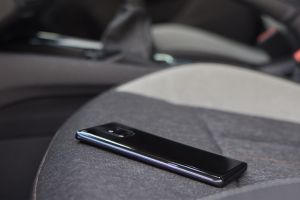 That’s precisely why laptops, tablets, phones, and thumb drives should be kept out of your car at all times. The simple reason for this is because they contain information that is too valuable for you to be stolen.
That’s precisely why laptops, tablets, phones, and thumb drives should be kept out of your car at all times. The simple reason for this is because they contain information that is too valuable for you to be stolen.
With electronics like phones and tablets, there’s more than just theft to worry about.
These devices can also be used to track your movements—even if they’re turned off or the battery’s dead.
That’s why I always wrap my phone in this special cloth whenever I leave it in the car or even just want a bit more privacy. It blocks all signals—Wi-Fi, Bluetooth, GPS, you name it. It’s a simple way to make sure no one can track you without your knowledge. For preppers like us, it’s just a smart precaution.
Additionally, you never want to leave electronic devices in your car when it gets hot, because high heat can damage the batteries and circuit boards.
Candles and Matches
Candles and matches are an excellent way to quickly get a small fire going for light and heat. But they’re not the best fire starting devices to keep in your car.
This is because candles can easily melt or deform under high heat, while matches can become less effective if they are stored at above normal room temperatures for extended periods.
As an alternative, keep a magnesium flint striker and a ziploc bag filled with cotton balls soaked in vaseline for your car survival kit’s fire starters instead.
Lighters
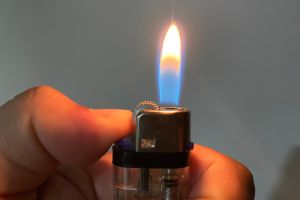 Lighters are another fire starting device that you should avoid keeping in your car.
Lighters are another fire starting device that you should avoid keeping in your car.
The reason is that it can also be vulnerable to extended high heat levels.
Again, go with a flint striker since it’s a far safer option.
Important Documents
It’s always a good idea to keep spares of your important documents like your financial records, birth certificates, insurance information, and passports, but these should be kept in a locked safe at home.
Don’t keep these documents in your vehicle, because again, there’s simply too great of a risk that they could become stolen.
Medications/Prescription Medications
Keeping a first aid kit in your car is always smart, but storing medications or prescription drugs there is something to reconsider. Heat, especially during summer, can break down medications and reduce their effectiveness over time. If you must keep meds in your vehicle, try to rotate them every six months to make sure they’re still usable.
Beyond basic first aid, it’s wise to think about stockpiling essential meds for emergencies. If you’re serious about preparedness, consider learning how to safely stockpile antibiotics. I found this guide that explains how to do it even without a prescription—having these essentials on hand in a real emergency could make all the difference.
Wet Wipes
Wet wipes are great for personal hygiene use, but they will degrade when they are continuously exposed to hot temperatures. This is also true even if they are kept in their container or bag that has not been opened. Look for alternative hygiene items to keep in your car instead, such as hand sanitizer and biodegradable soap sheets, both of which are far more effective at resisting warm temperatures.
Firearms (and Ammunition)
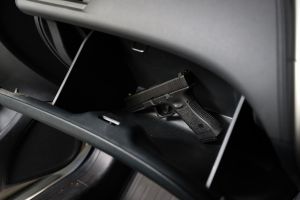 It may seem like a good idea to keep a handgun in your vehicle for self-defense. In fact, there’s an entire industry that revolves around car gun safes to facilitate this in a secure manner.
It may seem like a good idea to keep a handgun in your vehicle for self-defense. In fact, there’s an entire industry that revolves around car gun safes to facilitate this in a secure manner.
There’s always the risk that your firearm could become stolen because they are one of the top items that car burglars look for.
Extreme temperature variations can also impact the performance of ammunition; extremely hot temperatures can even cause ammunition to go off on its own.
Related: The Guns the Government Doesn’t Want You to Have
A better solution is to keep a firearm on your person (either open carried or concealed carried) when you enter and exit your vehicle.
Sunscreen
As ironic as it sounds, the ingredients in sunscreen can break down after prolonged exposure to high levels of heat, and in extreme circumstances, the entire bottle may explode!
Food
Be cautious about keeping food in your car. It’s very easy for food to spoil or grow bacteria, when it is exposed to high heat. And this includes non-perishable foods such as canned meats, fruits, and vegetables. But even if the food doesn’t spoil in this scenario, it can still result in it changing its flavor to the point that you won’t even want to eat it in the first place.
The best solution is to look for non-perishable foods that can tolerate high heat and to rotate those foods regularly. Granola bars, trail mixes, dried fruits, jerky, and cereal packs are all good options here.
Water Bottles
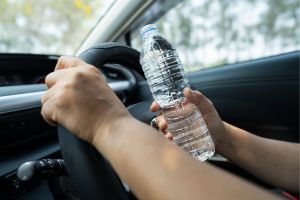 Likewise, keeping water in your car may be a good idea, but think twice about keeping water in your car in the form of plastic water bottles. That’s because allowing a bottle to sit in the sun could cause chemicals to fall off the bottle and into the water.
Likewise, keeping water in your car may be a good idea, but think twice about keeping water in your car in the form of plastic water bottles. That’s because allowing a bottle to sit in the sun could cause chemicals to fall off the bottle and into the water.
Related: How to Store Water in Your Car for an Emergency
Instead, carry water in your car in steel bottles or canteens, and make it a personal rule that you’ll rotate it out every month to reduce the risk of it developing any kind of harmful microorganisms.
While it’s very important for you to keep a complete survival kit or get-home bag in your car, you just want to be extremely strategic about the specific items that you choose to keep in it.
Hopefully this article has helped shine some light for you in regards to what you should and shouldn’t keep in your vehicle.
You may also like:
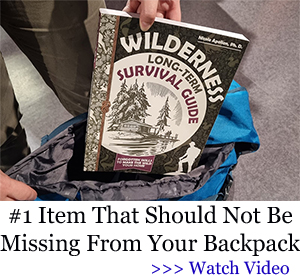 How to Preserve Your Vegetables Using Sand
How to Preserve Your Vegetables Using Sand
EMP-Proofing Myths No One Ever Told You
Ingenious Ideas for Taking Care of Your Chickens

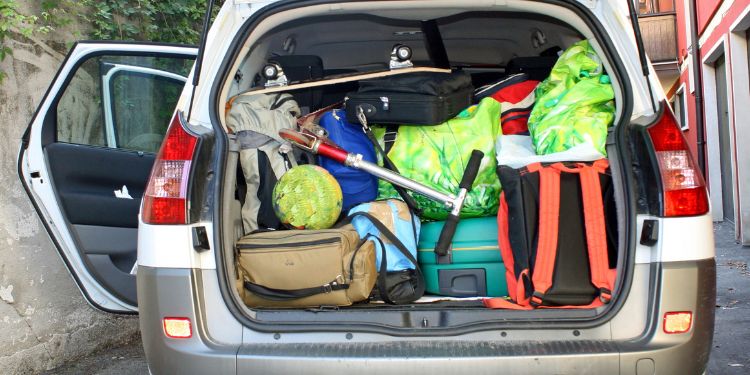







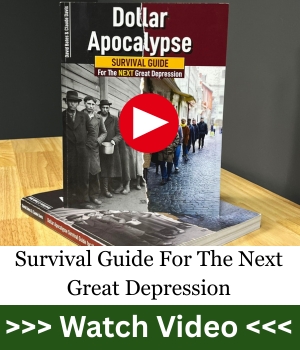



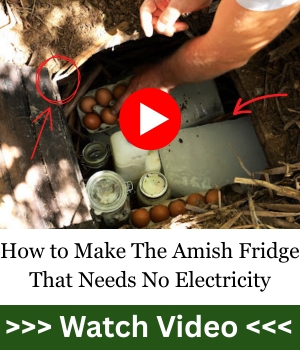








Talk about people on the move to a new permanent location. They need to keep many of those said items with them in their vehicle when they travel. I am about to move cross country and have to risk taking them with me vs. shipping with all my stuff via movers. Anyone have opinions on this? Seriously in these days I think using movers to move these items is risky, especially if they as in my case have to be stored until a new home is bought. I don’t even know if all my items will make it to my new destination esp. if war or natural disasters hit & that could be any moment & anywhere these days.
There are some movers that provide pods and storage, this one specifically https://www.pods.com/ they have been around for quite a while so they are not a fly-by-night operation & are full service and tick all boxes for pickup & delivery.
Do a search for movers and containers or something similar.
I just moved to a remote area of TN where PODS does not service–so definitely check to see if they service your new location. I used PACKRAT since they have no problem delivering to my new home in TN (I moved from DC just 3 weeks ago after 16 years). Note there is an extensive list of items neither PODS nor PACKRAT will allow you to ship in their containers: ammo, fuels, some cleaning supplies, certain batteries, etc, so be sure you check the list.
Take it with you. If you give it to the movers, they may travel to many destinations in many hands. In and out/in and out of another semi to another person(s).
Army brat, Navy wife, retired now. Never, ever let movers move ANYTHING that is not replaceable. In all my moves, all my friends moves, we all agree that anything you can’t replace, anything that is private paperwork, anything collectable that has monetary value, firearms, bows, etc. needs to always stay in your possession. Never allow the movers or yourself mark the outside of your boxes with what is inside. The movers have paperwork that lists each box and that has some info on what is in the boxes. But that list isn’t available to day labor or hired help.
Having been involved with many military moves I have to agree. We have experienced damages and loss even in sealed boxes. On more than one move/occasion we have ended up with someone else’s items, so we knew that our items had been transferred to different trucks.
Even the mail has been bad for losses. The short and sweet of it is you can insure many items but can’t replace the ‘nonreplaceable’!
Also, make sur the boxes ‘are not marked on the outside with the interior contents’. Number the boxes and keep a record on a separate sheet away from the boxes.
I agree with the others who say look into places like pods. U-haul has a service like pods as does abf/u pack.
When we were moving the bulk of our household from one location to another, pods didn’t deliver to our destination, but and/u-pack did.
It was a certain amount of money to transport the goods, and a separate amount if we needed the company to store our goods until we could receive them.
We had a landing spot already at the destination location. We packed our boxes ourselves, loaded them into the tractor trailer ourselves, and carried them off the tractor trailer ourselves.
We could easily carry the irreplaceable or sensitive things ourselves in our vehicle.
When we were doing this, it coincided with the time of year of many college kids returning to school, so seeing cars stacked with household goods or boxes was commonplace. There was nothing remarkable about us having some totes and a suitcase or two in our vehicle.
I moved myself from upstate NY to Oregon. I did this going on 30 years ago. I bought a box trailer and it took me two moves, but it was worth those long drives. I took different routes both times for both coming and going. It wasn’t expensive and by taking different routes, I got to see a lot more of our country. Now in our 70’s, we are thinking seriously about making one last move to a different state, a solid red state…
It s not what you store , but How you store it .
common sense , proper containers, Proper applications
Not just No , but do it right
as with anything , proper planning, prevents P Poor results
God is still on the throne and will be just in his judgements
There is a way that seem right to a man, woman and the end is Death and eternal punishment , but God always Provides , if we call out for him , in faith , trust , and obedience
Some discussion of colder climates may be appropriate. Liquids freeze but cnadles don’t. best to have a heat source that will turn ice into water. Propane will not freeze and a cammp stove can prove invaluable. Matches will not spontaneously combust at 50 degrees. Blankets are easy to include and dehydrated food pouches can last months. Just some ponderings.
Agreed. I forgot about a plastic 3L plastic bottle of water I had in my vehicle. The water froze solid, and the container became misshapen. I learned after that to carry a fresh bottle with me, AND to make sure I didn’t fill containers completely during the cold season.
Something as simple as rotating the food and water every month helps, too. And for those who live in a place with four seasons, check the stuff in your bags at the start or before the start of the next season.
I was into boating when i was young, and the first thing i was told was to always carry extra water, 3–5 days without it, and you die, food 30+ days before U die. Use common sense considering your environment etc. then plan around it. A method to communicate with the outside world if you need assistance should be at the top of your list.Plan and use common sense.
If U R @ home, just wrap whatever in something waterproof like a pool liner or place in a container like a PVC pipe and bury it as deep as possible, 6 ft. from the top will do fine no EMP will damage it.When you buy equipment, get something that is military surplus or meets current military standards for EMP strike / radiation. All military equipment must meet a certain military standard for it, or the military can not use it.
Don’t keep a gun in your car? Okay, when I first seen this noted, I thought it was bad advice. But then, after a thought, you are correct to not leave it in your car alone.
Keep it in a holster ON YOU at all times. Conceal/Carry
Nothing worse than having your gun stolen and then used on you.
why not
You can keep BP-5 survival / emergency biscuits in the car for long periods of time
This is just a guide, not saying absolutely yes or absolutely no on anything. If you must have that much direction then survival may not be your forte’.
what is a “magnesium flint striker”? as far as I know there is no such thing. are you talking about a flint and steel set? that is a chunk of flint or chert and striker made out of 1095 high carbon steel. you hold the flint, or chert, and strike the steel striker against a sharp edge of the flint, making a spark. which is steel being removed from the striker, and gets hot. but that is a skill that takes practice. or are you talking about a ferrocerium rod? that is a rod made up of several types of metals. round, 3″- 6″ in length, 1/4″ thick – 1/2″ thick. you need a striker made out of high carbon steel, usually 1095 carbon steel with a sharp 90 degree edge. hold the ferro rod close to your tinder, but not close enough to disrupt the tinder, strike the rod by running it the length of the rod, with a little pressure on the striker, but not much. that will produce sparks , that is some of the material being remove from the rod. not trying to be a smart ass. but calling a fire starter a “magnesium flint striker” are the wrong words to use. yes there are magnesium bars and ferrocerium rods. but the magnesium will not produce a spark if you strike it. but a spark will ignite the magnesium , if you scrape some shavings off the magnesium , a good sized pile, and hit it with a lighter, or a few sparks from a ferrocerium rod , it will ignite. and burn fast and hot. looking for a magnesium flint striker is like looking for a metric screw driver.
if I may, go to YouTube, look up Corporals Corner, he has a good demonstration on how to use a ferrocerium rod . and flint and steel . or Look up Dave Canterbury, both of them give simple to the point instructions.